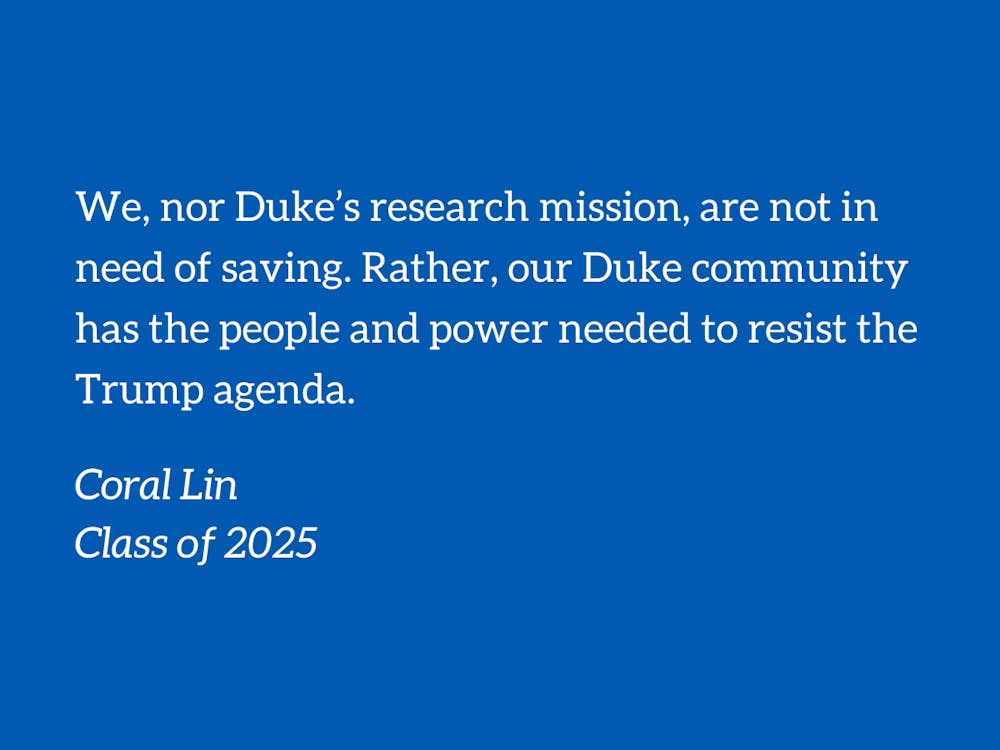On a random Friday morning, a few weeks after President Donald Trump’s executive order freezing federal grants and the National Institutes for Health (NIH) announced research funding slashes, Duke did something very strange. Rather than publish a formal press release, the university posted a four-slide infographic on its Instagram, asking “What if federal funding is cut?”. Citing the impact federal funding has on North Carolina’s research-driven economy and Duke’s reliance on NIH funds, Duke seemed to understand the grave implications that the Trump administration’s actions have on the university, the health system and the state. On four out of five graphics, there was an ominous platitude written: “Duke research saves lives. Now we need to save research.”
Okay — except, who exactly is Duke referring to when it talks about “us” and “we”? And who are we saving research from, and why?
The key details that this non-call to action obscures leaves Duke portrayed a victim of an unknown villain rather than an institution with influence across the state, the country and the world. If Duke wants to take the position that federal funding cuts are detrimental (which they are), then the university should not only admit it is not exactly a victim in need of saving, but also that these cuts are a direct result of the Trump administration, or at the very least, the federal government.
The University's position on the federal funding freeze is only the latest example of where Duke can and must do more in their position of immense power. By making a weak and vague statement that lacks accountability, the institution helps create an environment where its administration, students, faculty, staff and beneficiaries can feel helpless.
In reality, the Duke community benefits from its status as part of an elite institution with plentiful resources and a national platform. Duke boasts a large and powerful alumni network, a strong history of organizing and a student body of future leaders (and whose research, personal lives and employment prospects are affected by politics more than ever before). Not to mention the university’s D.C. office, situated strategically to secure federal funds and grants.
In choosing to be apolitical in its select statements, Duke undermines its own institutional goals, harming the entire Duke community. Notably, the statement on federal funding focuses only on NIH funding cuts affecting science and health research, failing to mention federal funding freezes and potential cuts that affect other areas. This leaves its international students, students who receive federal aid, trans students, undocumented students, social science and humanities researchers and its own Climate Commitment, among other priorities, in the dust. While Duke’s mission supports “knowledge in service of society,” its relative silence runs completely counter by allowing the federal government to disrupt and destroy the University’s pipeline for future researchers, public servants and thought leaders.
I am inspired by all that the Duke community has achieved: the world-class research, medical advances and wonderful alumni network are to be envied. This is why I know we can do better.
While the University may argue that quiet, behind-the-scenes policymaking is preferable given President Trump’s threats of retribution, this can’t be the only course of action. Duke need not make the loudest public statement, but it must devise a strategy to empower the community, not just put their head down and take it. We, nor Duke’s research mission, are not in need of saving. Rather, our Duke community has the people and power needed to resist the Trump agenda.
I also ask the Duke community to support each other through this time of uncertainty — not only through conversing through our fears and unease, but also by making our voices known to our administrators and elected representatives, such as Senators Ted Budd and Thom Thillis. We can’t afford to sit back and wait another four years for things to change.
Coral Lin is a Trinity senior.
Get The Chronicle straight to your inbox
Sign up for our weekly newsletter. Cancel at any time.

